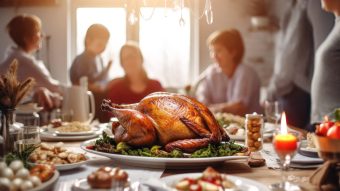
April 10, 2025
Contact: Sara Diedrich, 573-882-6217, diedrichs@missouri.edu
Even though wholesale prices of eggs are starting to drop, your Easter celebration might not be eggs-actly what you were hoping for this year. Eggs remain pricey — nearly twice as expensive as they were a year ago — and a dramatic price drop isn’t likely anytime soon.

However, there is some good news.
University of Missouri food price expert Hoa Hoang, a senior research associate and food policy economist with the university’s Food and Agricultural Policy Research Institute, said the bird flu outbreak is showing signs of easing, with the number of affected birds declining significantly in March.
“Stores have started restocking their shelves or removing the quantity limit imposed due to egg shortages,” Hoang said. “Some stores have started to cut prices. However, consumers may not see egg prices fall rapidly until retailers are confident the egg supply chain has stabilized. If the flu outbreak resurges, then elevated prices are expected to continue for a longer period.”
Easter traditionally drives a high demand for eggs, and depending on where local grocery stores source theirs, supplies may be limited. Hoang advises shoppers to purchase early to avoid shortages.
That’s a safe bet, because refrigerated store-bought eggs can last up to five weeks from the purchase date, according to food safety specialist Kantha Channaiah, a food scientist in the College of Agriculture, Food and Natural Resources and a food processing and safety specialist with Missouri Extension.
“Always purchase eggs that are sold from a refrigerator or refrigerated case and open the carton to ensure that the eggs are clean, and their shells are not cracked,” he said. “At home, store eggs in their original carton in a clean refrigerator at 40 degrees or below — and avoid storing eggs in the refrigerator door due to temperature fluctuation.”
Read on for more tips from Channaiah about how to properly prepare and store eggs this Easter season:

How can you tell if an egg is still safe to eat?
Perform a float test by placing an egg in a bowl of water: If the egg sinks, it’s considered fresh; if it floats, it’s unsafe to eat. Additionally, inspect eggs for discolorations or odors after cracking, and make sure that the egg white is cloudy or clear, not pink or discolored.
Is there a difference in food safety between store-bought and farm-fresh eggs?
When handled properly, store-bought and farm-fresh eggs are both considered safe. Here are some key differences when it comes to food safety and storage.
- Store-bought eggs are washed and sanitized to get rid of dirt and bacteria, which removes the natural protective coating, also known as the cuticle, on the eggshell. That makes refrigeration necessary to prevent bacterial growth.
- Refrigerated store-bought eggs are safe to eat for three to five weeks.
- Unwashed farm-fresh eggs often preserve their natural cuticle, which helps keep bacteria out and allows for extended storage at room temperature for up to three weeks. Washed farm-fresh eggs should be refrigerated because the cleaning process removes the cuticle.
- It is important to wash farm-fresh eggs before use and cook them thoroughly to reduce the risk of foodborne illness.
How long can hard-boiled eggs be left out before they become unsafe to eat?
It is not recommended to leave hard-boiled eggs at room temperature for more than two hours. That recommendation decreases to one hour if the temperature exceeds 90 degrees because bacteria can grow rapidly, making them unsafe to eat.
Is it safe to eat dyed Easter eggs? Are there any food-safe dyes you recommend?
Easter eggs dyed with food-safe or natural colorants and stored properly are safe to eat. However, avoid using synthetic paints or markers that are not food-grade. For a safer and more natural approach, opt for food-based dyes like beet juice or turmeric, or use FDA-approved food colorings.
If eggs are hidden outside for an Easter egg hunt, are they still safe to eat afterward?
Discard eggs that have been unrefrigerated for more than two hours, as they may no longer be safe to eat. To minimize risk, keep separate batches — one for consumption and another solely for egg hunts and decoration.
What are the safest ways to cook and store hard-boiled eggs?
Boil eggs for nine to 12 minutes (depending on their size) in a single layer and then quickly cool them in an ice bath. For best results, store hard-boiled eggs in their shells in the refrigerator and consume them within a week.



